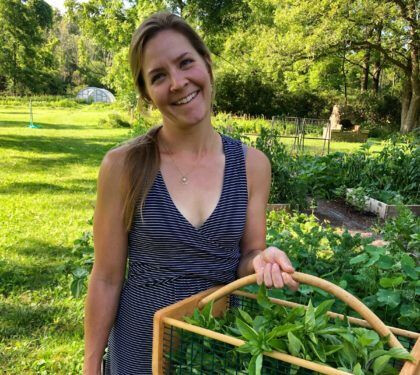Lynn Bliven: Recognizing the Small Successes that Grow with Time
Lynn Bliven wasn’t born into a farming family, but supporting agricultural economic development has become her life’s work. Lynn’s parents moved to the country not long before she was born, and a neighboring farm sparked her interest in animals and crops. In high school, she worked for a Cooperative Extension agent who also owned horses. That experience fueled her passion and gave her a career goal—to become a 4-H Educator.
She graduated from SUNY Morrisville and transferred to Cornell University where she earned a bachelor’s degree in animal science and a master’s in education. After graduation she landed her dream job and worked as a 4-H Educator for five years.
A unique opportunity presented itself: the Cooperative Extension in Allegany County was hiring an agriculture economic development specialist. Since the position was new, it was a chance to design the role to fit what the area needed. Lynn landed the job and soon launched a program for beginner farmers.
Throughout her tenure, she has cultivated a specialty in the development of local food systems and livestock production and brings a keen interest in food nutrient density to farmer conversations. In the late 1990s/early 2000s she began noticing increasing conversations around soil health. The timing coincided with her father’s Alzheimer’s diagnosis, and emerging research at that time linked Vitamin B and folate deficiencies to the memory loss caused by the disease.
“Nutrient density is what got me into soil health. With soil health we’re really thinking about what we can do better for efficiency,” she said. “There was some research finding correlations between animal health and nutrient deficiencies. The quality of food comes from the quality of what the animals ate, or the plants absorbed while growing. A food systems perspective is what got me into soil health.”
Fast forward 20 years–when she saw an announcement for the “Practical New York Soil Health Specialist Training” program she knew she had to enroll. Jointly hosted by the American Farmland Trust and Cornell ‘s Comprehensive Assessment of Soil Health program, in partnership with the Northeast Sustainable Agriculture Research and Education program, the training is creating a network of agricultural service professionals who can support and educate farmers on improving soil health.
“As a county educator I’m a jack of all trades, master of none,” she said. “So, the idea of meeting folks who are truly specialists in soil health and being a part of that network appealed to me. I also felt like I had expertise to contribute while picking up new information to bring back and help our farmers create more sustainable businesses.”
Specialist trainees get an in-depth understanding of the fundamentals of soil health and how it can be measured and monitored over time. Training also includes strategies for improving soil health through holistic, adaptive, management practices. Building organic matter doesn’t happen overnight, sometimes it takes years. But by working with farmers on small changes, like resting a pasture for six or eight weeks, the noticeable difference in plant growth creates a visual reward.
In Allegany County the soils and topography are well suited for permanent pasture, hay land, or forests. It is not as well suited for vegetable production. However, Amish families are buying former dairies and planting crops. Lynn has found the community to be open to working closely to improve soil health.
“I believe enhancing soil health is critical to economic sustainability for many of the small farms I work with. This is particularly true for fresh market vegetable growers and livestock producers in my region,” she said. “The soil health specialist training helped me understand the importance of recognizing the small successes that then build up over time.”
Trust and relationships are key components to encouraging farmers to embrace soil health management practices. Pre-COVID, Lynn regularly organized field days on operations using recommended techniques so others could see the difference first-hand. The COVID-19 pandemic paused in-person gatherings and shifted the focus of meetings to immediate needs, like helping dairy farmers who were dumping milk. However, with social distancing guidelines loosening and a return to on-site events, Lynn is eager to get back into the field and continue providing education on soil health management strategies.
In addition to working as an Agriculture and Natural Resources Issue Leader for the Cornell Cooperative Extension of Allegany County, Lynn and her husband Shawn operate a 52-acre farm in Rushford, New York. They raise Registered Hereford Cattle and Katahdin sheep and sell breeding stock and grass-fed beef and lamb.
Learn more about the New York Soil Health Specialists Program.
Story by Katie Navarra, Photography by Rebecca Drobis
This program is based upon work supported by the National Institute of Food and Agriculture, U.S. Department of Agriculture, through the Northeast Sustainable Agriculture Research and Education program under sub-award number ENE18-153-32231, and with support from the members of American Farmland Trust.




